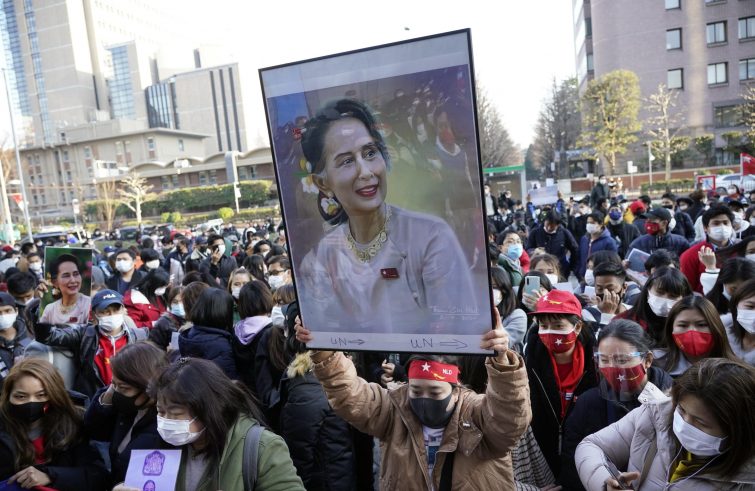
Nobody is leaving their homes. People in Yangon are afraid and don’t know who to turn to for information on the latest developments. Communication has been taking place via Messenger this morning, but the Internet and phone services have been disrupted, or so it seems. There are concerns that the web will be completely shut down at any moment, although there is much confusion about this too. A SIR source in Myanmar said the situation in Myanmar descended into chaos after Aung San Suu Kyi, leader of the National League for Democracy (NLD), was arrested this morning by the military. Myanmar President Win Myint and other NLD leaders had been “taken” in the early hours today and power has been handed over to commander-in-chief General Min Aung Hlaing. Fears of a coup are growing. The Military declared a state of emergency. For the past weeks the army has been alleging fraud in November’s elections, overwhelmingly won by the National League for Democracy (NLD). Last 8 November, the Party of Aung San Suu Kyi, Nobel Peace Prize Laureate in 1991, object of strong criticism by the international community for its handling of the Muslim Rohingya crisis, but widely popular among the population at large, won over 82% of 1,117 seats. The USDP, composed of several former military officials, won only 71 seats nationwide and refused to accept the results of the vote. The army claimed to have identified millions of individual cases of fraud, including thousands of 100-year-olds or underage voters. The arrests came just hours before the scheduled opening of the newly installed parliament.
The country has fallen into chaos. “People are afraid of communicating with foreigners”, SIR sources say. There is widespread “tension and fear. They detained not only political officials, but also some artists.” Leaders from around the world immediately condemned the incident. President Joe Biden was briefed on the events in Burma, including the arrest of Aung San Suu Kyi. The White House, “alarmed” by the reports, said the US “opposes any attempt to alter the outcome of recent elections or impede Myanmar’s democratic transition.” “I strongly condemn the coup carried out by the Myanmar military and call for the immediate release of those detained – tweeted EU High Representative Josep Borrell – Election results and constitution must be respected. Myanmar’s people want democracy. The EU stands with them.” In a tweet, the UK prime minister Boris Johnson declared: “I condemn the coup and unlawful imprisonment of civilians, including Aung San Suu Kyi, in Myanmar. The vote of the people must be respected and civilian leaders released.”
Cecilia Brighi, expert on the Asian country and president of the ”Italy-Burma friendship association” together”, is extremely worried. She has been in constant contact with her institutional representatives in Myanmar since last night, although they did not expect the situation to escalate to the point of the arrest of Aung San Suu Kyi, President Win Myint and other leaders. No direct news is available at the moment, as phone and communication networks are completely down. “I was on the phone from midnight to 4 a.m.,” Cecilia Brighi told SIR, ” It’s a disaster, we are all shocked. There were signs of warning, since the army had threatened a coup after the elections, alleging that 8 million ballots had been falsified and asking for a recount, in the wake of what happened with President Trump in the United States.”
The “Italy-Burma friendship association” is in the process of collecting signatures on the “Change” platform to ask the Italian government, the EU and the UN Security Council to impose severe sanctions against the military and to take “all the necessary measures to restore the rule of law, with the immediate release of all those arrested, starting with Burmese leader Aung San Suu Kyi and President Win Mynt”. But geopolitical balances are complex and delicate. “China has major interests in Rakhine (a State inside Myanmar where persecuted minorities live, such as the Rohingya Muslims, ed.’s note) and is playing a three-sided game in Myanmar: it finances ethnic organisations, brokers peace with the Rohingya but at the same time has substantial economic interests. China could oppose potential sanctions”, Brighi said. “Protests are bound to take place,” Brighi said, “because this time the people have no intention of backtracking: despite all the limitations of this partial democracy, under the military sword of Damocles, with restrictions on press freedom and arrests, civilised efforts were being made.” A difficult period lies ahead for the country’s ethnic and religious minorities (Christians and Muslims), many of whom are being persecuted ( 4,000 people in Karen State are displaced in the jungle, and the situation is worse in Rakhine). Cardinal Charles Bo, Archbishop of Yangon, has hitherto never been afraid to expose himself despite the risks. Pope Francis made an apostolic journey to Myanmar from 27 to 30 November 2017. On that occasion, in a meeting with government authorities, the Holy Father said: “The future of Myanmar must be peace, a peace based on respect for the dignity and rights of each member of society, respect for each ethnic group and its identity, respect for the rule of law, and respect for a democratic order that enables each individual and every group – none excluded – to offer its legitimate contribution to the common good.”












